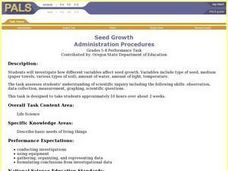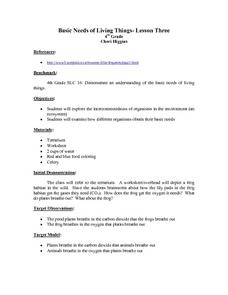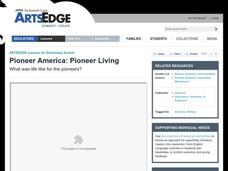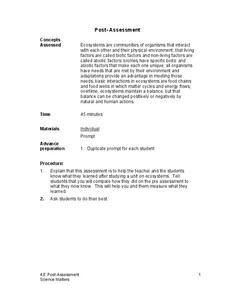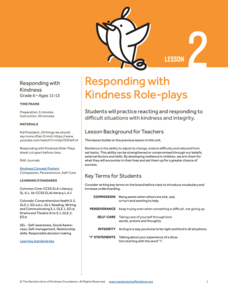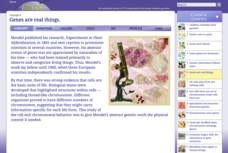Curated OER
Monitoring Energy Expenditure
Students use heart rate monitors and complete a swimming and running test. These tests allow students to obtain personal data, to manipulate the data through calculations of various parameters, and to graphically represent the data.
Curated OER
Seed Growth
Students develop an independent procedure to investigate the germination of two types of seeds. Students must construct data tables or charts to record observations and results, graph the data, and analyze the data.
Curated OER
Living Things Depend upon Each Other
Students research animals. They identify the animals' struggle for survival, and internalize the importance of preserving an ecosystem with animal life.They collect information and write a report on their findings. Additional cross...
Curated OER
Basic Needs of Living Things-Lesson Three
Fourth graders explore the interconnectedness of organisms in the environment and examine how different organisms obtain their basic needs. They discuss a frog's habitat and what is found in it. Students discuss the processes of...
Curated OER
Cells: The Units of Life
In this biology worksheet on cells, 9th graders name who the first person was to use the word cell and describe in what materials this person saw cells. Then they determine what instrument uses light and two or more lenses to view cells.
Curated OER
How Do Living Things Change With the Seasons?
In this seasons worksheet, students will explore the changes that plants and animals go through during the different seasons. This worksheet has 8 fill in the blank statements.
Curated OER
Birth, Growth, and Development
Students study the growth of humans and animals and their various stages. In this developmental lesson students study the life cycle and what that is in humans.
Curated OER
Biology: Humans as Organisms
Students examine body systems. In this biology activity, students explore the roles of different body systems and discover the effects of smoking, drugs, alcohol, exercise, and good nutrition on human body systems.
Curated OER
Water Snails
Students study water snails. For this water snails lesson, students research the habitats of water snails. After conducting research, students investigate water snails in their habitats and generate scientific observations.
Curated OER
Creating Nonviolence: A Theatre of the Oppressed Approach to Things Fall Apart
Eleventh graders analyze Ahimsa and complete activities for nonviolence. For this nonviolence lesson, 11th graders define violence and relate it to their lives. Students adapt prose into a dialogue to act out and analyze the violence in...
Curated OER
GDP and Standard of Living
Seventh graders discuss the GDP and Middle Eastern nations. In this standard of living lesson, 7th graders complete a worksheet during a lecture on the GDP. Students identify the impact of the GDP on a country and reasons for wanting to...
Curated OER
Things Living in a Pond
Ninth graders observe, compare, and classify various microorganisms using a microscope. They answer discussion questions, and record their observations on a chart.
Curated OER
The Important Things In Our Lives
In this online interactive English worksheet, students search and find 25 important attributes found in life in a word search puzzle.
Curated OER
Pioneer America: Pioneer Living
Fourth graders research pioneer life. In this pioneer lesson, 4th graders read the book Little House on the Prairie by Laura Ingalls Wilder and discuss what life was like for early pioneers. They research pioneers and show what they have...
Science Matters
Oh Heron
Two teams—the environmentalists and herons—play four rounds of the game, Oh Heron. Using hand symbols to represent food, shelter, and water, players locate their match to produce more herons while those unmatched decompose.
Science Matters
Post-Assessment
Twenty questions make up an assessment designed to test super scientists' knowledge of ecosystems. Scholars answer multiple-choice and short-answer questions about organisms, food chains, energy flow, and more.
ReadWriteThink
Compare and Contrast
Read about the ways that different cultures set up homes with a set of reading activities. Learners read short paragraphs that cover one or more different ideas, and answer four questions about what they have read, including whether or...
Huntington Library
Everyday Life - Exploring the California Missions
Young scholars relive history as they examine primary sources that document everyday life in the California missions. During a class viewing of the included slideshow presentation, children analyze documents, paintings, and drawings in...
Science Matters
Blubber Gloves: It’s All About Insulation
Instill the concept of adaptation with the help of Blubber Gloves—ziplock bags, shortening, and duct tape. Scholars discuss how animals and plants keep warm in polar regions, record their predictions, and try on their Blubber Gloves to...
Random Acts of Kindness Foundation
Responding with Kindness Role-plays
Thank you. Excuse me. I'm sorry! Pupils watch a video about encouraging things people should say more often. Next, they work in small groups to develop a role-play based on a difficult situation. They perform their role-plays for the...
Perkins School for the Blind
Matching Like Objects
Same and different, sorting, and tactile discrimination are what's on the agenda for today. The class practices sorting objects and attempts to determine which objects are the same and different and why. The purpose is to increase...
Cold Spring Harbor Laboratory
Genes Are Real Things
Proving microscopic structures exist is a difficult task. Learn how scientists did just that in the mid-1800s as they set out to identify the cellular structures related to genetics. The online lesson explains the collection of work that...
Council for the Curriculum, Examinations and Assessment
Morals, Values and Beliefs
Your personality is based on the things you believe in, the morals you abide by, and the values upon which you make your decisions. Delve into a set of lessons about values and moral framework with your eighth graders as they explore and...
CK-12 Foundation
Radiocarbon Dating
How do we know how long ago a dinosaur lived or an ancient fire pit was used? Scholars learn about the application of carbon dating and half lives to discover things about the past. They adjust the amount of radioactive carbon in the...



